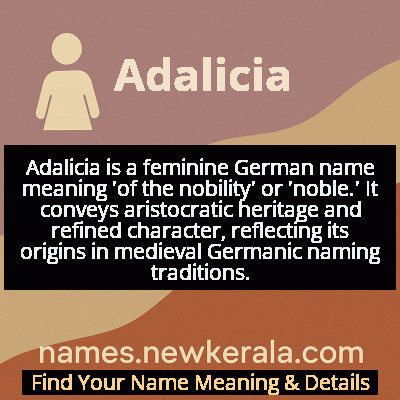Adalicia Name Meaning & Details
Origin, Popularity, Numerology Analysis & Name Meaning of Adalicia
Discover the origin, meaning, and cultural significance of the name ADALICIA. Delve into its historical roots and explore the lasting impact it has had on communities and traditions.
Name
Adalicia
Gender
Female
Origin
German
Lucky Number
4
Meaning of the Name - Adalicia
Adalicia is a feminine German name meaning 'of the nobility' or 'noble.' It conveys aristocratic heritage and refined character, reflecting its origins in medieval Germanic naming traditions.
Adalicia - Complete Numerology Analysis
Your Numerology Number
Based on Pythagorean Numerology System
Ruling Planet
Uranus (Rahu)
Positive Nature
Strong sense of order, loyal, practical, and disciplined.
Negative Traits
Stubborn, overly serious, rigid, and prone to feeling restricted.
Lucky Colours
Blue, gray.
Lucky Days
Saturday.
Lucky Stones
Blue sapphire.
Harmony Numbers
1, 7, 8.
Best Suited Professions
Managers, engineers, accountants, organizers.
What People Like About You
Dependability, discipline, practicality.
Famous People Named Adalicia
Adalicia of Normandy
Noblewoman
Countess of Burgundy, known for her political influence and patronage of religious institutions
Adalicia von Hessen
Royal consort
Princess of Prussia, remembered for her charitable works and cultural patronage
Adalicia de Montfort
Religious leader
Abbess renowned for her scholarship and reform of monastic practices
Adalicia von Hohenstaufen
Imperial princess
Key figure in medieval German politics, instrumental in diplomatic alliances
Name Variations & International Equivalents
Click on blue names to explore their detailed meanings. Gray names with will be available soon.
Cultural & Historical Significance
The name carries echoes of medieval courtly culture, where noble women often served as patrons of arts, education, and religious foundations, making Adalicia a name that embodies both aristocratic privilege and cultural responsibility. In Germanic regions, names beginning with 'Adal-' were particularly prestigious, indicating not just social standing but also the expectation of noble character and leadership. This cultural significance persisted through centuries, with Adalicia appearing in historical records of noble families across German-speaking territories, symbolizing the continuity of aristocratic traditions and values.
Extended Personality Analysis
Women named Adalicia are typically perceived as possessing natural leadership qualities, refined manners, and a strong sense of dignity. They often exhibit grace under pressure and maintain composure in challenging situations, reflecting the noble heritage embedded in their name. These individuals tend to value tradition and quality, showing appreciation for fine arts, classical education, and cultural preservation. Their inherent nobility manifests not as arrogance but as a deep-seated responsibility toward others, often taking on mentoring roles or community leadership positions.
Adalicias are known for their loyalty to family and principles, combined with a diplomatic approach to conflict resolution that makes them effective mediators and trusted advisors in both personal and professional spheres. They typically demonstrate excellent judgment and discretion, qualities that align with the name's aristocratic origins. While they may appear reserved initially, those who know them well appreciate their steadfast reliability and inner strength. The name suggests someone who carries themselves with natural authority while remaining approachable and compassionate—a balance that reflects the modern interpretation of true nobility as service rather than domination.
Modern Usage & Popularity
In contemporary times, Adalicia remains a rare but cherished name, primarily used by families with German heritage or those seeking a distinctive name with noble connotations. While not appearing on mainstream popularity charts, it has seen a modest resurgence among parents looking for vintage names with strong historical roots. The name is particularly favored in academic and artistic circles where classical names are appreciated, and it occasionally appears in historical fiction and period dramas, which helps maintain its cultural visibility. Modern Adalicias often shorten the name to 'Addie' or 'Licia' for casual use while maintaining the full name for formal occasions, reflecting the contemporary preference for versatile names that work across different contexts.
Symbolic & Spiritual Meanings
Symbolically, Adalicia represents the ideal of nobility not merely as social status but as moral character—embodying virtues of honor, integrity, and responsibility. The name carries connotations of legacy and heritage, suggesting a connection to ancestral wisdom and cultural continuity. Metaphorically, it symbolizes the bridge between tradition and modernity, representing how noble principles can adapt to contemporary contexts while maintaining core values. Adalicia also embodies the concept of 'noblesse oblige'—the idea that privilege brings responsibility—making it symbolic of leadership that serves others rather than dominates. The name suggests a person who carries themselves with natural dignity while using their influence for positive impact, representing the evolution of nobility from hereditary privilege to earned respect through character and contribution.

